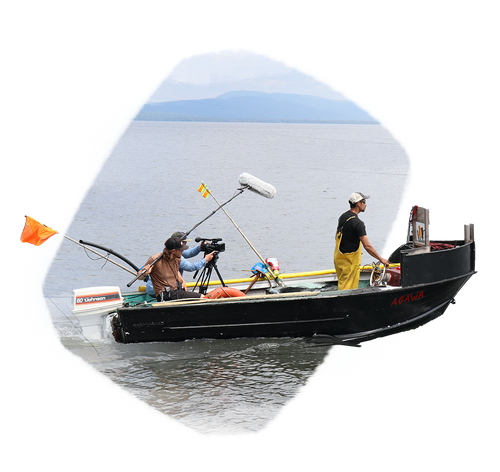Conference 2023 Keynote Recap - "Lake Superior Our Helper: Stories from Batchewanaung Anishinabek Fisheries"
Keynote: Lake Superior Our Helper: Stories from Batchewanaung Anishinabek Fisheries
For our opening keynote, we centred ourselves along the shores of Lake Superior. We ventured out onto the water with members of the Batchewana First Nation to explore the fisheries they have sustainably managed for millennium. We listened to the nation’s elders and knowledge keepers as they pulled us back in time before colonial encroachment. And we did all of this from our seats in the auditorium of the Bora Laskin Faculty of Law!
Film is such a wonderful storytelling medium. That is why former Chief Dean Sayers put this project in motion. He wanted to tell the story of his people and their long history of commercial fishing in Gichigami (Ojibwe for Lake Superior), where the nation’s fishers continue to assert their traditional rights today. With the help of Charles Levkoe, Kristen Lowitt and Sarah Furlotte, the Batchewana First Nation put together a powerful documentary titled “Lake Superior Our Helper: Stories from the Batchewanaung Anishinabek Fisheries”.
As we learned in the film, Batchewana’s traditional territories stretch from the eastern shore of Lake Superior, from Batchewana Bay to Whitefish Island. Vernon Syretty shared that the area once served as a regular meeting place for Anishinaabe people, and trade with the Iroquois. He also shared that fish caught in Lake Superior fed newcomers down south, and were shipped as far as Detroit. The fisheries sustained the nation and many surrounding communities.
Unfortunately, colonialism disrupted this vibrant system, and continues to have an impact today. The federal government has imposed a quota and licensing system for the fisheries in Lake Superior. Batchewana refuses to take part in the scheme, relying on the Robinson-Superior Treaty of 1850, which gives them the right to fish where their ancestors did. This has led to legal battles with the government, and a fight for their inherent rights.
Despite the many challenges, Batchewana currently operates the largest and most successful fishery on the Canadian side of Lake Superior. The nation’s governance model adheres to natural law, which does not change with a shift in government. The fishers bypass small fish, in order to ensure that there will be a strong supply for years to come. When they find an unintended catch in their net, they set it free. They don’t use intensive fishing techniques, such as bottom trawlers, and they limit the sizes of their nets.
The nation’s strength and commitment to the land was overwhelming. One story that truly resonated with me was that of an elder who used to walk the shorelines of Lake Superior to show her devotion. These “water walks”, as they were termed, signaled to settlers and government alike that members of the nation were still there, still carrying out the job the creator gave them; still protecting the lake.
Following the film, there was a roundtable discussion. We heard from Rick, a member of the Friends of the Attawapiskat River. He shared the importance of upholding the right to fish for future generations, and relayed a story about the first catch his grandson made. Rick took that opportunity to teach his grandson about the importance of sharing in community. He emphasized how important it was for him to connect with his people through food.
Michel Koostachin, another member of the Friends of the Attawapiskat River, highlighted the importance of natural law. He drew on the sacredness of his nation’s relation to the environment, and their promise to never take more than they need.
We also heard from Kerrie Blaise, a lawyer with Legal Advocates for Nature’s Defense (or LAND). Through her work, Kerrie gives a voice to those who have been historically ignored. She works with First Nations and various grassroots organizations to expand their access to justice. Leaving behind a kernel of advice for the next generation of lawyers, she emphasized that we have a duty to ensure that the precedents we set create space for Indigenous laws and their implementation.
